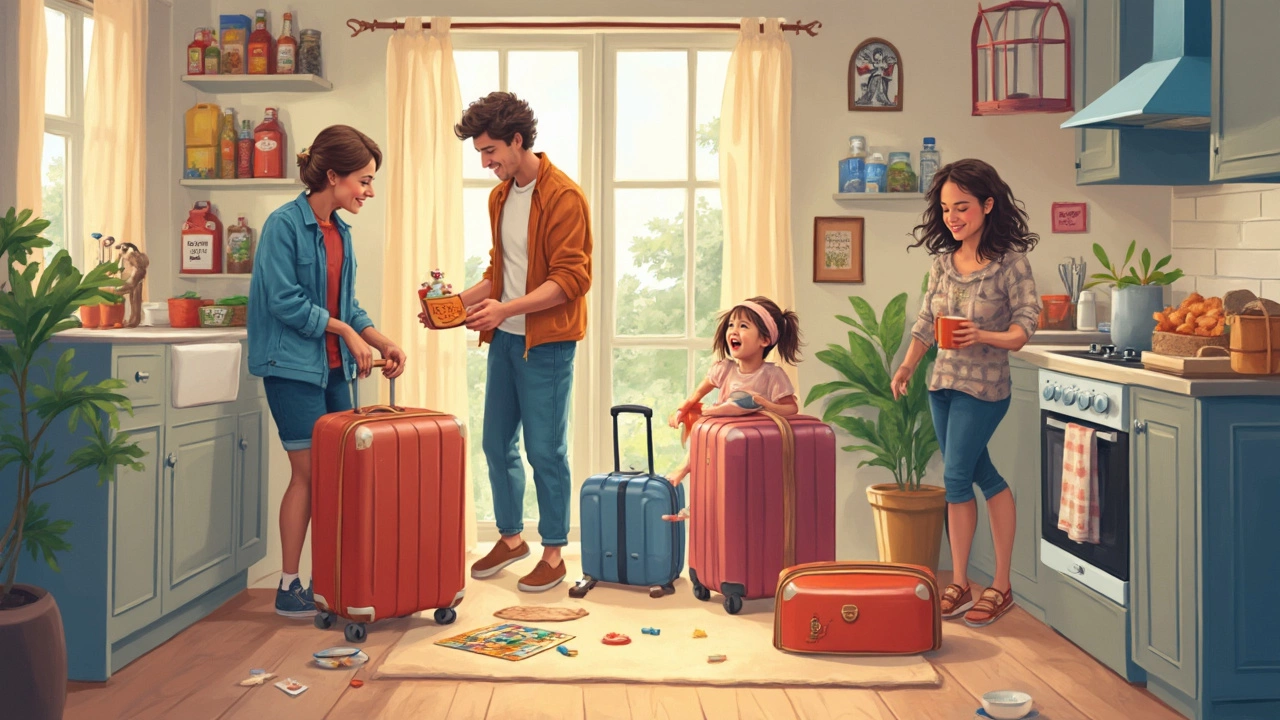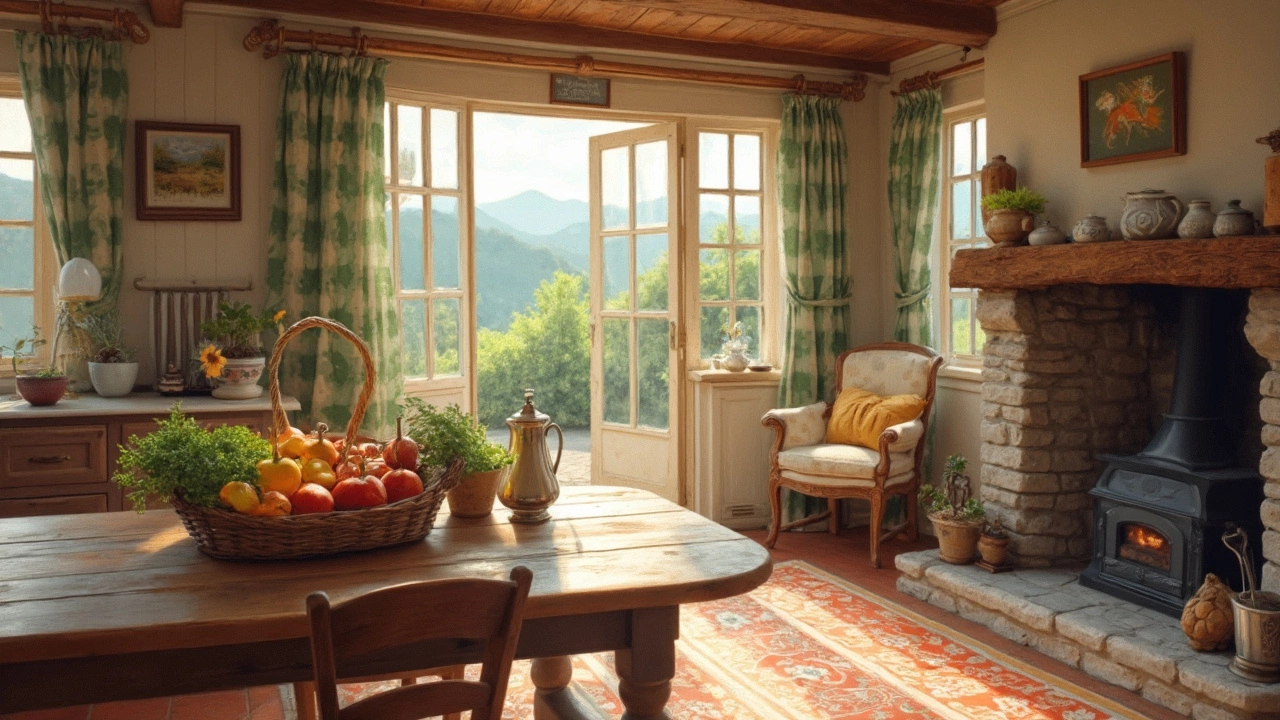If you've ever looked up holiday cottages and seen the phrase “self-catering,” you might have wondered what you're really signing up for. It’s pretty straightforward: you get a place that’s all yours, but you also take care of your own meals and daily chores—like you would at home, just in a new, sometimes much prettier location. No room service, no breakfast buffets, and no cleaners popping in every day. Sounds relaxing? That little touch of independence is exactly why so many people pick these spots.
You're usually getting more than just a bed and a bathroom. Self-catering cottages are like home base for your trip, with kitchens (or at least kitchenettes) that let you cook what you want, when you want. A fridge full of your favorites, a kettle for a late-night cuppa, maybe even a proper oven for big family meals. But it's not just about the food: there's more space to spread out, a living room to flop into after a hike, maybe a little private garden for morning coffee. It’s all about living your holiday, not just passing through it.
- What ‘Self-Catering’ Really Means
- Typical Features and Facilities
- What You’ll Need to Bring (and What’s Provided)
- Tips for a Smooth Self-Catering Stay
What ‘Self-Catering’ Really Means
When people talk about self-catering accommodation, it’s all about doing things your own way. You rent a cottage, apartment, or sometimes even a cabin, and you’re in charge of shopping, cooking, tidying up, and planning your daily routine. There’s no cleaning service or management popping in every morning. It’s your own space, working just like a home away from home.
Hotels offer convenience—buffet-style breakfasts, someone making your bed, and meals cooked for you. Self-catering flips that around. You get the keys, and it’s up to you to decide whether you make pancakes for breakfast or grab pastries from the local bakery. Evenings aren’t fixed around restaurant openings; you might BBQ in the garden or chill with takeaway pizza.
Here’s a quick breakdown of the most common types of self-catering accommodation:
- Cottages (rural, coastal, even tucked away in a forest)
- Apartments (in cities or by the sea)
- Lodges or cabins
- Converted barns or farmhouses
Unlike package hotels, self-catering isn’t about just turning up with your suitcase. You need to bring or buy food, toiletries, and anything else you want on hand. That’s a big reason these places appeal to families, groups, or anyone who likes flexibility. In the UK alone, VisitBritain reported that over 31 million domestic trips were taken to self-catering rentals in 2023—a solid sign people love the freedom these places offer.
Wondering why so many travelers go for self-catering? Take a look at this table comparing self-catering and hotel stays:
| Aspect | Self-Catering | Hotel |
|---|---|---|
| Meals | Cook your own, eat out, or order in | Usually set menu times, extra cost for room service |
| Space & Privacy | Entire property to yourself | Shared hallways, limited personal space |
| Cleaning | You do it (supplies usually provided) | Daily housekeeping |
| Flexibility | Come and go as you like | Reception hours, check-in/out policies |
If you like structure, hotels might feel safer. But if you want a more relaxed holiday that runs on your schedule, self-catering gives you plenty of freedom. There’s no set breakfast time, no dress code, and nobody minding if you wear pajamas to brunch at your own kitchen table.
Typical Features and Facilities
So what exactly do you get when you book a self-catering accommodation? Most cottages try to cover all the basics, but every property is a little different, so here’s what’s common—and what to double-check before you click 'book.'
First up, the kitchen is the heart of any self-catering place. Expect the essentials: a fridge, stove or hob, oven, microwave, kettle, and toaster. You’ll almost always find pots, pans, dishes, mugs, and cutlery, though how fancy or basic these are can vary. Some places even throw in a dishwasher, which makes a week-long stay so much easier. Don’t forget the little things like can openers or wine glasses—some cottages go all out, while a few keep it basic.
Bedrooms tend to come with full sets of bedding, but the quality varies. Sometimes, you get thick duvets and extra pillows; other times, it's just the basics. Most places provide bath towels, but it’s smart to bring your own beach towels if you’re heading for a swim. Bathrooms usually include toilet paper for the first day or two, but extra isn’t always restocked.
- Free Wi-Fi is the norm these days, though remote locations might have spotty service.
- Heating is standard, but not every cottage has air conditioning. In cooler climates, look for cottages with a log burner or open fireplace for those cozy nights.
- Private parking is often included, but in village locations you might get street parking only.
- Many self-catering cottages have washing machines, and a few offer dryers. This is a lifesaver for longer stays and family trips.
- Outdoor features are hit and miss. Some places offer a private garden, BBQ, or patio set. Others stick to the basics.
Here’s a quick snapshot of what’s typically included in British self-catering cottages, based on a 2024 survey by StayCottage Rentals:
| Facility | Percentage of Cottages |
|---|---|
| Fully Equipped Kitchen | 95% |
| Free Wi-Fi | 87% |
| Washing Machine | 72% |
| Dishwasher | 58% |
| Garden/Outdoor Space | 65% |
| Parking (On-Site) | 81% |
Be sure to skim the property’s listing for any extras—things like highchairs, fireplaces, or Netflix make a difference, especially if you’re traveling as a family or know you’ll have some cozy nights in. And if anything’s unclear, there’s no shame in sending a quick message to the owner. It’s better to know if you’re getting sharp chef’s knives or just a rusty can opener before you show up.

What You’ll Need to Bring (and What’s Provided)
Every self-catering accommodation covers the basics, but not all give you the same welcome pack. Usually, you’ll find enough to get you started: beds made up, a few rolls of toilet paper, and towels waiting in the bathroom. Kitchens should have pots, pans, and the usual cooking gear, plus crockery, cutlery, glasses, and a kettle. Expect washing-up liquid and maybe a sponge too. Some owners throw in a few tea bags or even local goodies. But the fridge won’t be stocked, so you’ll need to hit the shops for food.
If you’re after café-style coffee, bring your favorite beans or pods—most cottages only include a basic kettle. Dishwashers are pretty common in modern places, but tablets for them aren’t always provided. The same goes for laundry: check if there’s a washer and dryer, and toss in some detergent if you plan to do clothes. Don’t assume there’s a hairdryer, iron, or every plug adapter you’ll need either. It pays to double check what’s listed by the owner before you leave home.
Here’s a quick packing checklist to save you last-minute headaches:
- Any special foods, coffee, or tea you can’t do without
- Extra dishwasher and laundry tablets
- Personal toiletries beyond the basics (bath gel is often a small hotel-style mini)
- Charging cables, adapters, and tech you rely on
- Your favorite pillow or blanket, if that matters to your sleep
- Outdoor gear like wellies, rain jackets, or hiking boots (especially in the countryside)
- Games, books, or streaming devices for downtime
Some cottages do a starter pack—milk, bread, or jam—especially if you’re staying in the UK or Ireland. But always plan to buy your main groceries locally, since that’s a big part of the self-catering experience! If you have kids or babies, bring what you need for them: high chairs and cots usually need to be requested.
Tips for a Smooth Self-Catering Stay
Want to actually relax in your self-catering cottage? It starts with planning. Bring what you need, double-check what’s included, and skip any last-minute dashes to the shop. Here are some tried-and-true tips from repeat travelers and hosts:
- Ask for an inventory list. Most owners are happy to email you a current list of what’s in the kitchen and cupboards. This way, you’ll know if there’s a corkscrew (crucial!) or if those “starter packs” actually mean a dab of washing up liquid and a single dishwasher tab.
- Bring the basics. A lot of cottages have a “starter pack,” but if you’re staying more than a weekend, pack extra bin bags, tea towels, loo paper, and dish soap to avoid finding yourself on a hunt for supplies the first night.
- Check heating options. Nearly one in five self-catering cottages in the UK use storage heaters or wood-burning stoves instead of central heating. If you’re coming during chillier months, ask if extra logs or portable heaters are included or should be brought.
- Be ready to recycle. Many rural spots have stricter recycling rules than cities. Find the recycling instructions (often in the welcome folder) so you’re not stuck with a week’s worth of bottles at the end of your stay.
- Don’t count on fast Wi-Fi. Rural cottages sometimes run on satellite or very basic broadband. Download movies, maps, or playlists before you travel, especially if you’ve got kids needing entertainment on rainy days.
- Meal plan for local shops. Rural self-catering means the nearest big supermarket could be 30 minutes or more away. Stock up before you arrive, or ask for a list of local farm shops and delivery services in advance.
If you’re curious about the most common things people forget or regret not knowing, here’s a quick look:
| Most Forgotten Item | Why It Matters |
|---|---|
| Tea towels | Kitchens usually provide just one or none, and drying dishes is a must. |
| Salt & spices | Most cupboards are empty—no one wants to buy a giant pack for one week. |
| Charger adapters | Differing plug types catch people out, especially in UK and Europe swaps. |
| Bin bags | Rubbish builds up faster than you think and extras aren’t always supplied. |
If you want a self-catering accommodation to really feel like home, a few five-minute prep tasks before you zip up your suitcase can save hours of hassle later. Don’t be shy about messaging your host—they can usually answer questions that the website glosses over, like where the best fishmonger or bakery is. And if you’re traveling with kids, always ask about stair gates or high chairs in advance—the small stuff makes a big difference!
